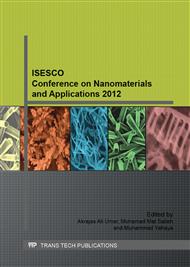[1]
K. Arifin, E.H. Majlan, W.R. Wan Daud, M.B. Kassim, Bimetallic complexes in artificial photosynthesis for hydrogen production: A review, International Journal of Hydrogen Energy 37 (2012) 3066-3087.
DOI: 10.1016/j.ijhydene.2011.11.052
Google Scholar
[2]
M.Grätzel,Dye-sensitised solar cells,Journal of Photochemistry and Photobiology C: Photochemistry Reviews4 (2003) 145-153.
DOI: 10.1016/s1389-5567(03)00026-1
Google Scholar
[3]
B. O'Regan, M.A. Grätzel, A low-cost, high-efficiency solar cell based on dye-sensitised colloidal TiO2 films,Nature353 (1991) 737-739.
DOI: 10.1038/353737a0
Google Scholar
[4]
H. Tributsch, Layer-type transition metal dichalcogenides - a new class of electrodes for electrochemical solar cells,berichte der bunsengesellschaft/physical chemistry chemical physics 81 (1977) 361-369.
DOI: 10.1002/bbpc.19770810403
Google Scholar
[5]
L. Persaud, A.J. Bard,A.Campion, M.A. Fox, T.E. Mallouk S.E. Webber J.M. White, Photochemical hydrogen evolution via singlet-state electron-transfer quenching of zinc tetra(N-methyl-4-pyridyl)porphyrin cations in a zeolite L based system,Journal of the American Chemical Society109 (1987) 7309-7314.
DOI: 10.1021/ja00258a011
Google Scholar
[6]
J.I. Goldsmith W.R. Hudson M.S. Lowry T.H. Anderson,S. Bernhard,Discovery and high-throughput screening of heteroleptic iridium complexes for photoinduced hydrogen production,Journal of the American Chemical Society 127 (2005) 7502-7510.
DOI: 10.1021/ja0427101
Google Scholar
[7]
M.S. Lowry, J.I. Goldsmith, J.D. Slinker, R. Rohl, R.A. Pascal Jr.,G.G. Malliaras,S. Bernhard,Single-layer electroluminescent devices and photoinduced hydrogen production from an ionic iridium(III) complex,Chemistry of Materials17 (2005) 5712-5719.
DOI: 10.1021/cm051312+
Google Scholar
[8]
D. Katakis,C. Mitsopoulou, J. Konstantatos, Photocatalytic splitting of water,Journal of Photochemistry and Photobiology A: Chemistry 68 (1992) 375-388.
DOI: 10.1016/1010-6030(92)85246-q
Google Scholar
[9]
A. Zarkadoulas,E. Koutsouri, C.A. Mitsopoulou, A perspective on solar energy conversion and water photosplitting by dithiolene complexes,Coordination Chemistry Reviews 256 (2012) 2424-2434.
DOI: 10.1016/j.ccr.2012.04.016
Google Scholar
[10]
E. Lyris,D. Argyropoulos C.A. Mitsopoulou,D. Katakis,E. Vrachnou, New catalyst in the photo-oxidation of water,Journal of Photochemistry and Photobiology A: Chemistry 108 (1997) 51-54.
DOI: 10.1016/s1010-6030(96)04432-2
Google Scholar
[11]
P. Falaras C.A. Mitsopoulou,D. Argyropoulos,E. Lyris,N. Psaroudakis,E. Vrachnou,D. Katakis,Synthesis, cyclic voltammetric and electrospray mass spectrometric studies of a series of tris-substituted 1,2-dithiolene complexes of tungsten and molybdenum, Inorganic Chemistry 34 (1995) 4536-4542.
DOI: 10.1021/ic00122a008
Google Scholar
[12]
C. Mitsopouplou,J. Konstantatos, D. Katakis,E. Vrachnou, Dithiolenes: a cheap alternative to platinum for catalytic dihydrogen formation. The case of tris-[1-(4-methoxyphenyl)-2-phenyl-1,2-ethylenodithiolenic-S,S']tungsten, Journal of Molecular Catalyst67 (1991) 137-146.
DOI: 10.1016/0304-5102(91)85041-y
Google Scholar
[13]
W.F. Mark Lee, J.M. Lorna M.B. Kasssim, Sifat foto-kimia kompleks molibdenum ditiolena,Sains Malaysiana 41(2012) 597-601.
Google Scholar
[14]
W.F. Mark Lee, K.H. Ng,J.M. Lorna A.A. Umar M.B. Kassim,Penentuan aras jalur tenaga kompleks tungsten nitrosilditiolena,Sains Malaysiana 41 (2012) 439-444.
Google Scholar
[15]
K. Sonogashira,Development of Pd–Cu catalyzed cross-coupling of terminal acetylenes with sp2-carbon halides, Journal of Organometallic Chemistry 653 (2002) 46-49.
DOI: 10.1016/s0022-328x(02)01158-0
Google Scholar
[16]
K. Sonogashira, Y. Tohda,N. Hagihara, A convenient synthesis of acetylenes: catalytic substitutions of acetylenic hydrogen with bromoalkenes, iodoarenes and bromopyridines,Tetrahedron Letters16 (1975) 4467-4470.
DOI: 10.1016/s0040-4039(00)91094-3
Google Scholar
[17]
J.A. McCleverty, D. Seddon N.A. Bailey N.W. Walker, The chemistry of cyclopentadienyl and related nitrosyl complexes of molybdenum. Part V. Dihalogenonitrosyl[tris(pyrazolyl)borato] molybdenum complexes, their alcoholysis, and the crystal structure of chloronitrosylisopropoxo[tris(4-chloro-3,5-dimethylpyrazolyl)borato] molybdenum,Journal of the Chemical Society, Dalton Transactions10 (1976) 898-908.
DOI: 10.1039/dt9760000898
Google Scholar
[18]
S. Trofimenko, Boron-Pyrazole Chemistry,Journal of the American Chemical Society88 (1966) 1842-1844.
Google Scholar
[19]
J.M. Lorna R.W.D. Wan M.B. Kassim, An overview of photocells and photoreactors for photoelectrochemical water splitting,International Journal of Hydrogen Energy 35 (2010) 5233-5244.
DOI: 10.1016/j.ijhydene.2010.02.133
Google Scholar
[20]
N.A. Kelly, T.L. Gibson, Design and characterization of a robust photoelectrochemical device to generate hydrogen using solarwater splitting,International Journal of Hydrogen Energy 31 (2006) 1658-1673.
DOI: 10.1016/j.ijhydene.2005.12.014
Google Scholar
[21]
W.F. Mark Lee K.H. Ng,J.M. Lorna A.A. Umar M.B. Kassim,A Molybdenum Dithiolene Complex as a Potential Photosensitiser for Photoelectrochemical Cells,International Journal of Hydrogen Energy xx (201x)xxxx. (In Press)
DOI: 10.1016/j.ijhydene.2012.12.015
Google Scholar
[22]
H. Hofmeier U.S. Schubert,Recent developments in the supramolecular chemistry of terpyridine-metal complexes,Chemical Society Reviews33 (2004) 373-399.
DOI: 10.1039/b400653b
Google Scholar
[23]
C.J. Kleverlaan M.T. Indelli C.A. Bignozzi,L. Pavanin,F. Scandola G.M. Hasselman, G.J. Meyer,Stepwise charge separation in heterotriads. Binuclear Ru(II)-Rh(III) complexes on nanocrystalline titanium dioxide,Journal of the American Chemical Society 122 (2000) 2840-2849.
DOI: 10.1021/ja992755f
Google Scholar
[24]
L. Hammarström,F. Barigelletti, L. Flamigni, M.T. Indelli, N. Armaroli, G. Calogero, M. Guardigli J.P. Sauvage,A study on delocalization of MLCT excited states by rigid bridging ligands in homometallic dinuclear complexes of ruthenium(II),Journal of Physical Chemistry A 101 (1997) 9061-9069.
DOI: 10.1021/jp971875b
Google Scholar
[25]
J.P. Sauvage, J.P. Collin J.C. Chambron, S. Guillerez, C. Coudret, V. Balzani, F. Barigelletti, L. Flamigni, Ruthenium(II) and osmium(II) bis(terpyridine) complexes in covalently-linked multicomponent systems: Synthesis, electrochemical behavior, absorption spectra, and photochemical and photophysical properties,Chemical Reviews94(1994) 993-1019.
DOI: 10.1021/cr00028a006
Google Scholar
[26]
C.J. Kleverlaan, M. Alebbi, R. Argazzi, C.A. Bignozzi, G.M. Hasselmann G.J. Meyer, Molecular rectification by a bimetallic Ru-Os compound anchored to nanocrystalline TiO2,Inorganic Chemistry39 (2000) 1342-1343.
DOI: 10.1021/ic991311h
Google Scholar


